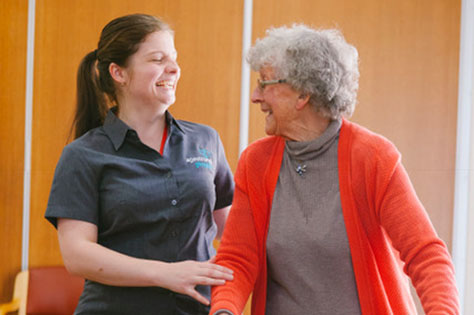What does the future of aged care physiotherapy look like?
For many years, Agestrong Physio has been at the cutting edge of physiotherapy in aged care and is committed to changing the face of allied health service quality.
When I talk to professionals from the more traditional streams of physiotherapy, they don’t seem to fully appreciate the opportunities, challenges and rewards offered to those working in our sector. Their responses are often tainted and leave the perception of working with our older generation as unfulfilling, a step ‘backwards’ or clinically not challenging. Perhaps because of all the previous abuse of our main programs funding stream, however like many things in life perception is not always reality.
Working within the aged care sector is possibly the most challenging yet rewarding career choice that I ever made.
Sheryl Aldcroft – Agestrong Managing Director
This same statement has been echoed by many of my senior therapist that have joined our company from a variety of backgrounds, private practice, hospital and rehabilitation.
The therapists that have come to join us at Agestrong Physio really want to be be part of ‘something’ and make a difference in someone’s life. They embrace the movement towards redefining the role of allied health within this sector that is the ethos of Agestrong, as I do, and see it for all its challenges and show a lot of passion for what they do. A common theme, not just with our therapists, but others within the sector in which I have spoken too, has been that they have had the opportunity to expand into what would otherwise be non-traditional physio roles, of which they are loving.
More than just tick and flick
Physiotherapy in aged care is about much more than massage and pain management services. Increasing age can bring with it multiple and complex medical conditions. As an allied professional, working with the elderly includes treating individuals with cardiac issues, respiratory problems and degenerative neurological conditions like Parkinson’s as well as re-enabling those post stroke or acute musculoskeletal injury.
It’s a segment of the sector with a lot to offer in terms of variety, it has excellent prospects for career progression and diversity and affords opportunities for therapists to develop additional skills around business acumen, leadership and operational management. There is a real opportunity for skilled, experienced physiotherapists, with different and varied work history to join the sector and help change that overall skill base that currently exists. The industry would greatly benefit from attracting therapists that have excellent clinical insight and reasoning and whom are looking for a new challenge. Existing skills and knowledge are transferable, whether they you been working within the hospital environment, outpatient clinic or in private practice. The right clinician could use those abilities to promote high standards of care for the benefit of elderly Australians.
Whether you’re interested in clinical education, senior support or hands-on care, there are often more positions available in aged care than in the typical hospital environment. As well as being enormously rewarding, aged care can be a flexible and family-friendly. So, it may suit those with young children, people who are looking to work part time or who don’t want the pressures of on-call and weekend working.
A new challenge
However, this definitely doesn’t mean that the work is easy or unchallenging. At Agestrong Physio, we believe that the future of aged care is going to be about taking a more clinically focused, evidence-based approach where practitioners will have more autonomy and be able to use their clinical judgement to assess, treat and discharge patients. The government appears to agree with us, a report has supported the use of a holistic and consumer directed care approach in residential facilities and a move towards more restorative care. Both physios and occupational therapists should aim to help each individual build on their existing abilities and strengths, enabling them to both maintain and relearn self-care skills so that they can be more independent, while still staying safe.
For this vital role, we need motivated, high calibre professionals. People who can see the benefits in building a long-term relationship with a patient and having the autonomy and opportunity to make a real difference to their quality of life. If it sounds like I’m making a sales pitch, well maybe I am. But there’s a reason for that. I’ve seen the benefits of good care and I’ve also seen the way elderly residents become frustrated or withdrawn when their care and contact is substandard. In my experience, there is no greater job satisfaction than helping the people who have done so much for our country, live out their lives with dignity.



